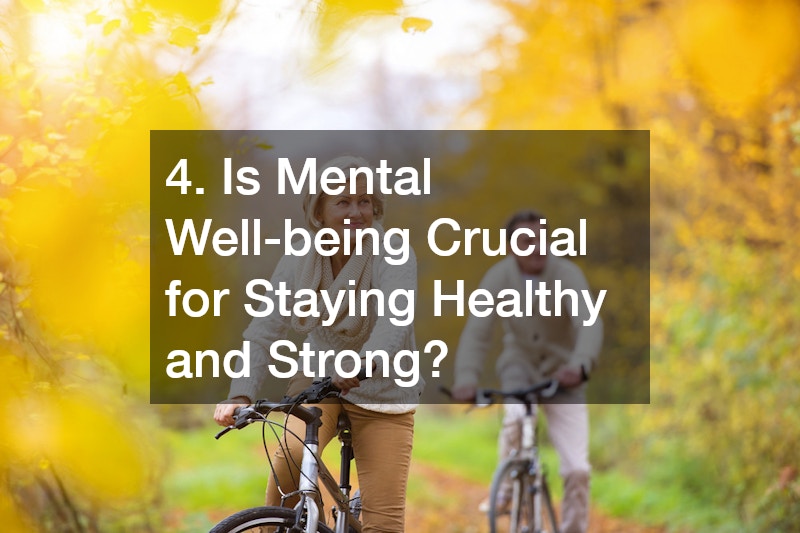As we get older, staying healthy and strong becomes increasingly vital to enjoying a fulfilling and active lifestyle. Aging doesn’t mean a decline into frailty and inactivity; rather, it’s an opportunity to embrace habits and practices that promote vitality and strength. This article delves into essential strategies to support your health and strength as you age, exploring topics like nutrition, exercise, sleep, mental well-being, and lifestyle adaptations.
Understanding the importance of a holistic approach to health in your later years can empower you to remain active and engaged. By maintaining physical, mental, and emotional wellness, you can enjoy your golden years with independence and vigor. Let’s explore the key areas of focus that contribute to staying healthy and strong as we age.
1. What are the Essential Nutrients to Stay Healthy and Strong?

A balanced diet packed with essential nutrients is the cornerstone of staying healthy and strong. Key nutrients like calcium, vitamin D, omega-3 fatty acids, fiber, and antioxidants are crucial for maintaining bone density, reducing inflammation, and supporting overall bodily functions. Ensuring adequate intake of these nutrients through a varied diet or supplements can bolster your defenses against common age-related health concerns.
Leafy greens, nuts, seeds, fish, and whole grains are excellent sources of these vital nutrients. These foods not only nourish your body but also provide the energy needed to stay active and engaged in daily activities. Considering the role of nutrition in immune health is also essential; for instance, zinc and vitamin C can enhance your body’s ability to ward off infections, including those identified through covid testing services, signaling a strong immune system’s importance in aging.
Additionally, consulting with healthcare providers can guide nutritional decisions tailored to individual needs. They can assess any deficiencies and recommend the right supplements, thus contributing to improved health outcomes. Their role extends to ensuring that your diet remains balanced and that any necessary adjustments are made to support longevity and vitality.
2. How Can Exercise Keep You Healthy and Strong?
Regular physical activity is pivotal in maintaining a healthy and strong body as you age. Exercise enhances muscle strength, flexibility, and cardiovascular health, all of which are crucial for maintaining independence. Engaging in activities such as walking, swimming, and strength training can improve your overall wellbeing and reduce the risk of chronic diseases.
A personalized exercise regimen can address specific health needs, such as improving balance and coordination. Consulting an ear nose and throat specialist can help tailor exercises that prevent dizziness or falls. This not only aids in sustaining physical strength but also boosts confidence in daily movements.
Incorporating consistent exercise into your routine is an investment in your future health. It’s vital to find activities that you enjoy to ensure adherence, making it a sustainable part of your lifestyle. When combined with other aspects of healthy living, exercise translates to a stronger, more resilient body prepared to face the challenges of aging.
3. What Role Does Sleep Play in Staying Healthy and Strong?
Sleep is often underestimated in its role in keeping individuals healthy and strong. Quality sleep is essential for cognitive functions, emotional regulation, and physical recovery. As people age, maintaining a regular sleep schedule can aid in reducing the risk of insomnia and other sleep-related disorders.
Problems like sleep apnea or insomnia can significantly impact one’s health and strength, making it important to seek appropriate treatment. For instance, autoimmune treatment options can sometimes influence sleep quality, highlighting the importance of a comprehensive approach to treatment. Integrating practices like meditation and establishing a calming pre-sleep routine can significantly enhance sleep quality.
Moreover, a restful night’s sleep supports heart health, weight management, and energy balance. It allows your body to repair and regenerate, ensuring you wake up feeling refreshed and ready to tackle the day. Fostering good sleep hygiene, therefore, is crucial in maintaining health and strength into older age.
4. Is Mental Well-being Crucial for Staying Healthy and Strong?

Mental well-being is just as crucial as physical health in staying healthy and strong. It encompasses cognitive sharpness, emotional resilience, and a positive outlook on life, which are essential for leading a fulfilling life. As you age, taking steps to nurture your mental health can prevent issues like depression and anxiety.
Engaging in activities that stimulate the brain, such as puzzles and reading, can improve cognition and prevent memory decline. Incorporating practices like mindfulness and meditation can reduce stress and enhance emotional health. For those with visual impairments, seeking appropriate eye treatment can improve quality of life, contributing to overall better mental wellness.
Maintaining social connections is another vital component of mental well-being. Social interactions provide emotional support and reduce feelings of loneliness, common challenges in older age. Building and maintaining a robust social network is an investment in both mental and physical health.
5. How Does Stress Management Influence Your Health and Strength?
Effective stress management is key to staying healthy and strong, as chronic stress can lead to various health problems. Stress can negatively impact the immune system, increase blood pressure, and contribute to the onset of diseases. Therefore, learning to manage stress effectively is crucial as you age.
Mindful techniques such as yoga, meditation, and deep-breathing exercises can significantly ease stress levels. Regular physical activity, too, plays a dual role in both enhancing physical health and mitigating stress. Seeking support from professionals, like counselors or therapists from a weight loss clinic, can also provide tailored strategies to manage stress.
Ultimately, adopting habits that reduce and manage stress will preserve your health and vitality. This holistic approach encourages not just the absence of stress-related ailments but also the promotion of overall well-being. In the long run, stress management aids in sustaining a robust and resilient health system as you age.
6. Why is Regular Health Screening Important for Staying Healthy and Strong?
Regular health screenings are pivotal in detecting potential health issues early, ensuring you remain healthy and strong. These screenings can help identify conditions like hypertension, diabetes, or high cholesterol before they escalate into severe problems. By staying proactive about your health, you can take preventative measures to maintain wellness.
Regular visits to medical professionals, including a local oral surgeon or primary care physician, ensure your dental and overall health are continuously monitored. Early detection makes treatment more effective and prevents complications that could arise from progressive diseases. Thus, staying on top of your health through routine check-ups is essential in maintaining vitality.
Additionally, keeping track of medical records and appointments can be streamlined with the help of medical billing services. These services help manage and organize your health data efficiently, ensuring nothing is overlooked. A coherent picture of your health history helps medical professionals make better decisions regarding your ongoing care.
7. What Lifestyle Changes Can Help Maintain Health and Strength?

Lifestyle changes form an integral part of staying healthy and strong into older age. Adopting habits such as a balanced diet, regular physical activity, and adequate hydration can significantly contribute to overall health. Each of these elements works synergistically to optimize bodily functions and promote longevity.
Modifying lifestyle habits to limit intake of processed foods, sugars, and excessive salt can prevent chronic diseases and maintain optimal health. In addition to diet, visiting a family dentist regularly supports oral health, which is often a window to overall health. An unhealthy mouth can be a precursor to various health issues, which is why oral care should never be overlooked.
Prioritizing activities and habits that catalyze strength and health may require the support of healthcare professionals. Guidance from experts ensures that the changes are safe, effective, and suitable for your individual needs. Such modifications promote a balanced and comprehensive approach to health, paving the way for a vibrant lifestyle.
8. How Does Maintaining a Healthy Weight Contribute to Health and Strength?
Maintaining a healthy weight is paramount in being healthy and strong, as weight has a direct impact on various aspects of health. A healthy weight supports cardiovascular health, reduces the burden on joints, and decreases the risk of chronic diseases such as type 2 diabetes. Additionally, a balanced weight enhances energy levels, allowing for sustained physical activity and engagement.
Weight gain or loss should be approached with healthy practices, ideally under guidance from healthcare providers, such as those at a weight loss clinic. They can formulate personalized plans focusing on nutrition, physical activity, and behavioral changes, catering to sustainable weight management. This guidance ensures that any weight changes are beneficial rather than detrimental to health.
It’s important to view a healthy weight as one component of a larger health strategy. When combined with other lifestyle adjustments, maintaining a healthy weight contributes to overall health, strength, and longevity. This approach ensures that efforts to remain healthy and strong are comprehensive and effective.
Healthy weight maintenance also involves understanding that balance is key—crash diets, excessive exercise, or restrictive habits can often do more harm than good. Long-term success comes from gradual, mindful changes that support metabolism, hormone regulation, and emotional well-being. Incorporating nutrient-dense meals, staying hydrated, and managing stress all play crucial roles in maintaining a healthy body composition. In addition, regular check-ins with healthcare professionals can help track progress and adjust plans as needed. By prioritizing sustainable habits and professional guidance, individuals can achieve a weight that not only supports their physical health but also promotes confidence, resilience, and overall vitality.
9. Can Supplements Aid in Staying Healthy and Strong as You Age?
Supplements can play an auxiliary role in remaining healthy and strong, particularly when dietary intake may not fulfill all nutritional needs. They can help bridge nutrient gaps, ensuring the body receives adequate vitamins and minerals. However, supplements should be viewed as complementary rather than replacements for a balanced diet.
Nonetheless, it is crucial to rely on reputable sources and advice when considering supplements to avoid potential adverse effects or interactions. Professionals within a medical spa or wellness clinic setting can provide insight into appropriately incorporating supplements into a broader health strategy. Using quality supplements responsibly ensures they serve to enhance, rather than compromise, your health objectives.
When combined with healthy eating, regular exercise, and consistent sleep, supplements can help maintain long-term wellness and vitality. They can also support recovery after physical activity, improve energy levels, and assist with skin health when paired with proper hydration. It’s important to remember that the body functions best when nutrients come from a variety of sources. By integrating supplements as part of a personalized plan—rather than a one-size-fits-all solution—you can promote a more sustainable, balanced approach to overall well-being.
10. How Important is Flexibility and Balance in Staying Healthy and Strong?

Flexibility and balance are foundational for maintaining a healthy and strong body, particularly as we age. They support mobility, reduce the risk of falls, and enhance the ability to perform everyday tasks with ease. Exercises that promote these qualities, such as yoga and tai chi, are beneficial additions to any fitness routine.
Regular practice of flexibility and balance exercises improves posture, joint health, and muscle function. Working with home care agencies or fitness professionals can help tailor these exercises to suit individual health needs and conditions. This personalization ensures safety and maximizes the benefits of each movement.
By prioritizing balance and flexibility in your exercise routine, you lay a strong foundation for a robust physique. These qualities enable a proactive approach to aging, where prevention and preparation supersede treatment and reaction. Ultimately, focusing on these aspects contributes significantly to overall health, strength, and quality of life.
Staying healthy and strong as you age is an ongoing journey of adopting and maintaining healthier habits tailored to your individual needs. This involves a synergistic focus on nutrition, exercise, mental health, stress management, and regular health check-ups. Embracing these practices empowers you to navigate the aging process with strength, grace, and vitality.
A holistic and proactive approach ensures that aging isn’t something to be feared but rather an opportunity to thrive. By preparing today, you invest in a future characterized by better health, greater independence, and an active, fulfilling life. Remember, the steps you take now contribute to a lifetime of wellness and strength.


